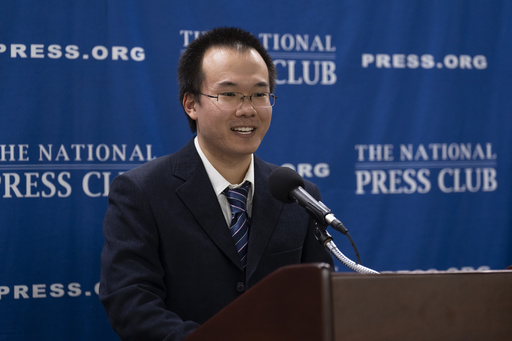In Washington, the son of Dong Yuyu, a Chinese journalist charged with espionage, is advocating for his father’s release from a seven-year prison sentence. This case has become a prominent example of Beijing’s intensified control over journalism. Dong Yuyu, who was a senior editor at a newspaper managed by the Communist Party but at odds with the party’s tougher stance, faced arrest in February 2022 while having lunch with a Japanese diplomat in Beijing.
Dong Yufu, speaking at the National Press Club, revealed that his father intends to appeal the convictions. He called on Japanese authorities to demonstrate that his father’s meetings with Japanese diplomats were unrelated to espionage activities. “This is an issue of press freedom and human rights, not about national security or spying,” Dong Yufu asserted.
The Chinese Foreign Ministry has yet to respond to requests for comments. Dong Yuyu served as deputy head of the commentary section at Guangming Daily, known for having a more liberal stance compared to other party-aligned media. His writings often addressed topics like constitutional democracy, political reform, and government accountability—subjects once openly discussed in party publications but now increasingly suppressed.
Dong’s distinguished academic background includes being a Nieman Fellow at Harvard University from 2006 to 2007 and a visiting fellow and professor at Japanese universities before returning to China. His arrest in 2022 just two months before his planned retirement surprised many in both journalism and diplomatic circles in China. Journalists frequently engage with diplomats as part of their professional duties, making such meetings a standard practice.
During court proceedings, Dong Yufu heard that his father’s eight meetings with Japanese diplomats were used as evidence against him. The Beijing No. 2 Intermediate People’s Court handed Dong a seven-year sentence in November, which his family finds unjust. Nicholas Burns, the former U.S. Ambassador, publicly criticized the ruling.
Despite the circumstances, Dong Yuyu is reported to be maintaining his health by executing a rigorous daily exercise, though he suffers from limited sunlight and is restricted from seeing his wife. His lawyer meets with him monthly, bringing letters from his wife. He has also composed a 45-page handwritten appeal for his case.
The U.S. State Department recently called for Dong’s immediate and unconditional release, emphasizing the issue through their social media channels. Reporters Without Borders, a Paris-based organization, condemned China’s press freedom environment, labeling it as the “world’s largest prison for journalists” with more than 100 media personnel currently detained. The organization claims that China frequently exploits charges of espionage to suppress journalists and employs broadly defined accusations such as subversion and “picking quarrels and provoking trouble” to clamp down on dissent.


